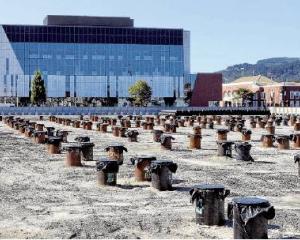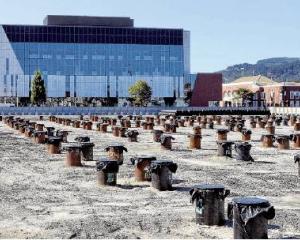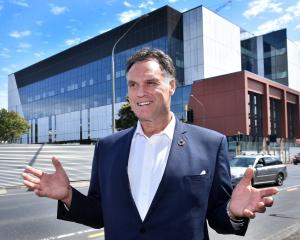
Documents released under the Official Information Act showed the clinical transformation group - which was tasked with leading the design of the new hospital - expressed concern about successive governments’ "value management" of the project and stressed that any delay to the project would pose a big risk to the region’s health system.

The memo’s authors were Dr Sheila Barnett and Prof Patrick Manning. It was sent to officials on September 24.
"We are concerned that proposals to achieve cost savings at this late and pressured stage cannot provide the same degree of robust clinical and operational interrogation that has informed the current design," they said.
"These proposals include strategies such as the re-lifing of old buildings for clinical services, staged delivery of a redesigned new Dunedin hospital, and splitting inpatient services between sites."
Two days later, Health Minister Shane Reti and Infrastructure Minister Chris Bishop announced the government would either scale back the project at the former Cadbury’s site or retro-fit the existing hospital at a budget of $1.88 billion.
In the leadup to the announcements, the clinical transformation group warned officials about the risks of retro-fitting the existing hospital.
"We have noticed increasing recent rhetoric that the new Dunedin hospital is ‘too big and too complex’.

"It should be noted that the design capacity and service provision of the new Dunedin hospital have been extensively tested and peer reviewed by independent clinicians and health planners and now more recently by Health NZ itself."
The memo also warned about other canvassed changes to the hospital project such as the re-lifing of old buildings for clinical services, staged delivery of a redesigned new Dunedin hospital, and splitting inpatient services between sites.
It said such an approach could lead to "a cascade of unpleasant surprises, delays, escalating costs, and knock-on effects and interruptions on multiple clinical services throughout the building".
"The project’s size and complexity are appropriate for the tertiary services it provides to the whole of urban and rural Southland, Otago and, increasingly, South Canterbury; the ageing population; its geographical isolation from other tertiary centres; and the expected 50-year-plus life of the building."
Having everything on one site was vital to the new hospital’s success, the memo said.
"Specifically, any [designs] that involve dislocating inpatient services between two remote buildings, or dislocating the inpatient building from the outpatient building will inevitably create clinical risk.
"Dunedin is not of the size where this can be achieved safely without significant additional investment in duplication of staffing and resources, and this will be reflected in operating costs."
A spokeswoman for Dr Reti’s office said clinical input had been consistently recognised during the course of this project.
"HNZ continues to assess and review the options to successfully deliver [a] new Dunedin hospital.
"They will report their advice for consideration by ministers as soon as possible.
"We again want to provide reassurance that the government is committed to strengthening the delivery of public health services in the South.
"Far from cuts, this government has significantly increased funding for the project by hundreds of millions of dollars. We promised $30m during the campaign, and we’ve now set aside $290m in government to keep the inpatients build alive."











